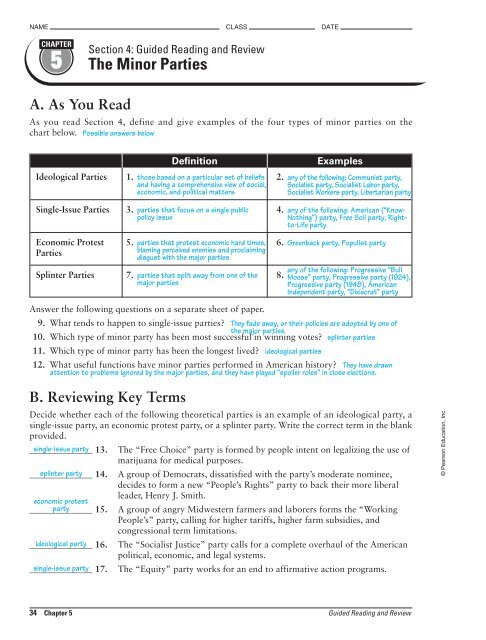0130679593
0130679593
0130679593
You also want an ePaper? Increase the reach of your titles
YUMPU automatically turns print PDFs into web optimized ePapers that Google loves.
NAME CLASS DATE<br />
CHAPTER<br />
5<br />
Section 4: Guided Reading and Review<br />
The Minor Parties<br />
A. As You Read<br />
As you read Section 4, define and give examples of the four types of minor parties on the<br />
chart below. Possible answers below<br />
Definition<br />
Single-Issue Parties 3. parties that focus on a single public 4.<br />
policy issue<br />
Examples<br />
Ideological Parties 1. those based on a particular set of beliefs 2. any of the following: Communist party,<br />
and having a comprehensive view of social, Socialist party, Socialist Labor party,<br />
economic, and political matters<br />
Socialist Workers party, Libertarian party<br />
Economic Protest 5. parties that protest economic hard times, 6. Greenback party, Populist party<br />
Parties<br />
blaming perceived enemies and proclaiming<br />
disgust with the major parties<br />
Splinter Parties 7. parties that split away from one of the 8.<br />
major parties<br />
any of the following: American (“Know-<br />
Nothing”) party, Free Soil party, Rightto-Life<br />
party<br />
any of the following: Progressive “Bull<br />
Moose” party, Progressive party (1924),<br />
Progressive party (1948), American<br />
Independent party, “Dixiecrat” party<br />
Answer the following questions on a separate sheet of paper.<br />
9. What tends to happen to single-issue parties? They fade away, or their policies are adopted by one of<br />
the major parties<br />
10. Which type of minor party has been most successful in winning votes? splinter parties<br />
11. Which type of minor party has been the longest lived? ideological parties<br />
12. What useful functions have minor parties performed in American history? They have drawn<br />
attention to problems ignored by the major parties, and they have played “spoiler roles” in close elections.<br />
B. Reviewing Key Terms<br />
Decide whether each of the following theoretical parties is an example of an ideological party, a<br />
single-issue party, an economic protest party, or a splinter party. Write the correct term in the blank<br />
provided.<br />
______________ single-issue party 13.<br />
______________ splinter party 14.<br />
economic protest<br />
______________ party 15.<br />
______________ ideological party 16.<br />
______________ single-issue party 17.<br />
The “Free Choice” party is formed by people intent on legalizing the use of<br />
marijuana for medical purposes.<br />
A group of Democrats, dissatisfied with the party’s moderate nominee,<br />
decides to form a new “People’s Rights” party to back their more liberal<br />
leader, Henry J. Smith.<br />
A group of angry Midwestern farmers and laborers forms the “Working<br />
People’s” party, calling for higher tariffs, higher farm subsidies, and<br />
congressional term limitations.<br />
The “Socialist Justice” party calls for a complete overhaul of the American<br />
political, economic, and legal systems.<br />
The “Equity” party works for an end to affirmative action programs.<br />
© Pearson Education, Inc.<br />
34 Chapter 5 Guided Reading and Review


